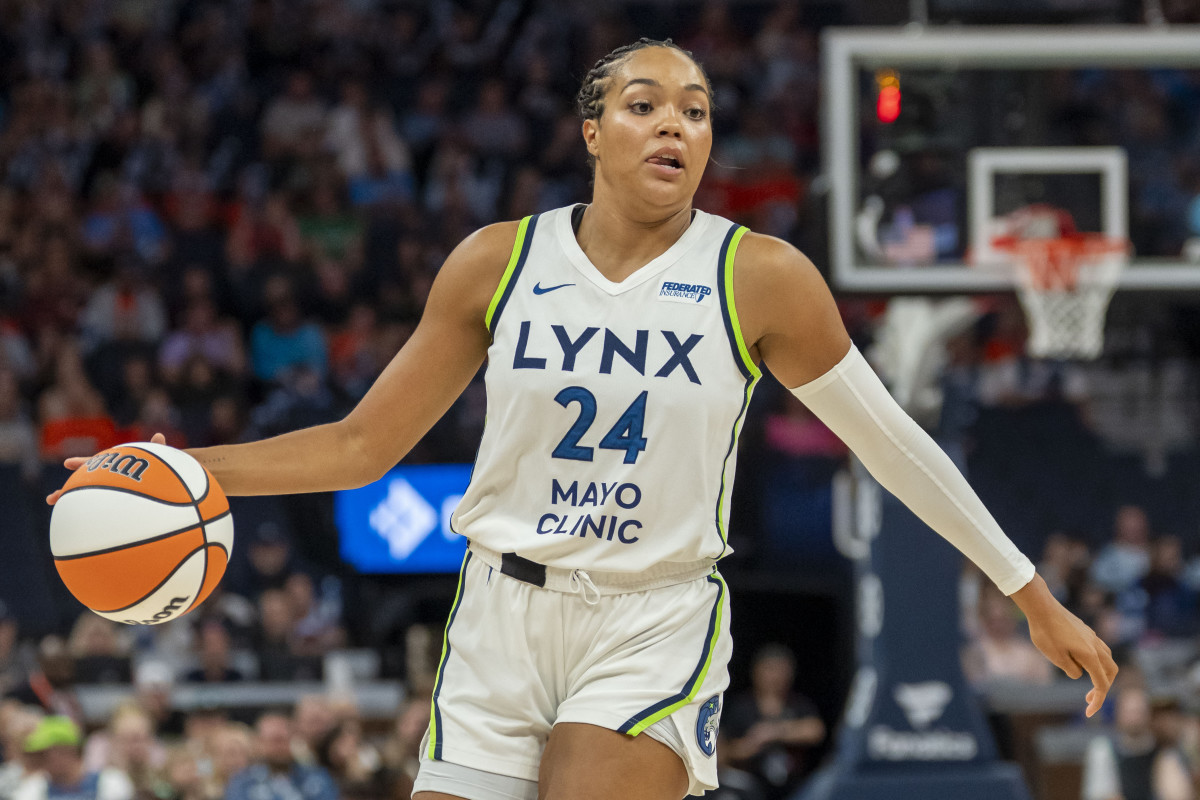The Women’s National Basketball Association (WNBA), currently enjoying an unprecedented surge in popularity, is now navigating an explosive internal crisis, ignited by a bombshell revelation from one of its star players. Napheesa Collier, a formidable presence on the court and co-owner of “Unrivaled,” has publicly accused Commissioner Cathy Engelbert of making dismissive and inflammatory remarks regarding player concerns about officiating, injuries, and the league’s overall treatment of its athletes. This exposé has sparked an immediate and furious backlash from across the WNBA, with prominent players like Sophie Cunningham and Lexie Hull rallying behind Collier and demanding accountability from the league’s highest office.

Collier’s “pipe bomb” revelation, delivered with raw emotion during a post-season exit interview, centered on several shocking comments allegedly made by Commissioner Engelbert. First, Collier claims Engelbert told her that “only the losers complain about the refs”—a statement that has infuriated players and fans alike, who have long voiced concerns about inconsistent officiating and uncontrolled physicality. This comment directly contradicts the collective experience of players who routinely battle through brutal physical play, often leading to injuries.
Second, Collier revealed a deeply tone-deaf comment regarding the league’s biggest star. When asked about player compensation, Engelbert allegedly told Collier that Caitlin Clark, whose arrival has single-handedly brought unprecedented viewership and revenue to the league, “should be grateful she makes $60 million off the court because without the platform that the WNBA gives her, she wouldn’t make anything.” Furthermore, Engelbert reportedly stated that “players should be on their knees thanking their lucky stars for the media rights deal that I got them.” These comments betray a fundamental misunderstanding of the modern sports landscape, where athletes like Clark build massive personal brands independent of, and often larger than, the leagues they play in. They also dismiss the players’ own contributions to the league’s growing success.
The context of Collier’s statement adds another layer of urgency to the crisis. She revealed she tore multiple ligaments in her ankle during Game 3 against Phoenix, a painful reminder of the physical toll WNBA players endure. “We go to battle every day to protect the shield for a league that doesn’t value us, man,” Collier stated, directly challenging the commissioner’s perceived disconnect from player realities and highlighting a systemic issue of player health and safety being ignored.
Engelbert’s response, a carefully worded statement expressing “utmost respect for Nefi Collier and for all the players in the WNBA” and disheartened by how Collier “characterize[d] our conversations,” has done little to quell the outrage. Many are questioning how Engelbert can retain her position, with some pundits suggesting her job is now untenable, particularly given the perceived arrogance and dismissiveness of her alleged remarks.
The backlash from other players has been swift and emphatic. Sophie Cunningham, another vocal figure in the league, retweeted Collier’s sentiments and added a searing indictment of Engelbert: “People only know Kathy because of Caitlyn. She’s the most delusional leader our league has seen and shouldn’t [in caps] ever be about our commissioner in the first place.” This comment directly challenges Engelbert’s leadership style, accusing her of attempting to capitalize on Clark’s fame for personal visibility rather than prioritizing the players who drive the league’s success.

Lexie Hull, the Indiana Fever guard known for her quiet toughness, also publicly supported Collier. “I think I agree with everything she said,” Hull stated, emphasizing that “we’re at a really important time in the league and changes need to be made.” Hull’s endorsement is particularly significant, coming from a player on a team that has been central to the league’s recent surge in popularity and media attention, further underscoring the widespread dissatisfaction.
This crisis highlights a long-simmering tension within the WNBA. For years, players have advocated for better treatment, improved conditions, and greater respect for their athletic contributions. The league’s dramatic growth, largely fueled by new stars and increased fan engagement, has brought unprecedented attention—and with it, new demands for accountability from its leadership. Critics argue that Engelbert and other league officials, once operating in a less scrutinized environment, are now struggling to adapt to the demands of a rapidly expanding, highly visible enterprise.
The “only losers complain” mentality attributed to Engelbert is seen by many as deeply insulting to a fanbase that is more engaged and critical than ever before. It suggests a dismissal of legitimate concerns, equating constructive criticism with weakness rather than a desire for improvement. Furthermore, the implication that Clark should be grateful to the league for her endorsements fundamentally misunderstands the modern sports landscape, where athletes cultivate massive personal brands independent of, and sometimes even larger than, the leagues they play in.
As the WNBA navigates this turbulent period, the controversy surrounding Commissioner Engelbert threatens to overshadow the on-court action. This isn’t just about a few disgruntled players; it’s a battle for the soul of a league at a pivotal moment in its history. The unified stand of players like Collier, Cunningham, and Hull signals a clear message: they are no longer willing to accept being undervalued or dismissed. The “enemy of my enemy” dynamic, as one commentator put it, has brought together disparate voices in a powerful, collective demand for change.
The outcome of this confrontation—whether Engelbert retains her position, and how the league addresses these fundamental concerns—will undoubtedly shape the future trajectory of the WNBA. What is clear is that the free pass for dismissive leadership is over. The players, who have tirelessly built this league into what it is today, are now demanding the respect and accountability they have long deserved.